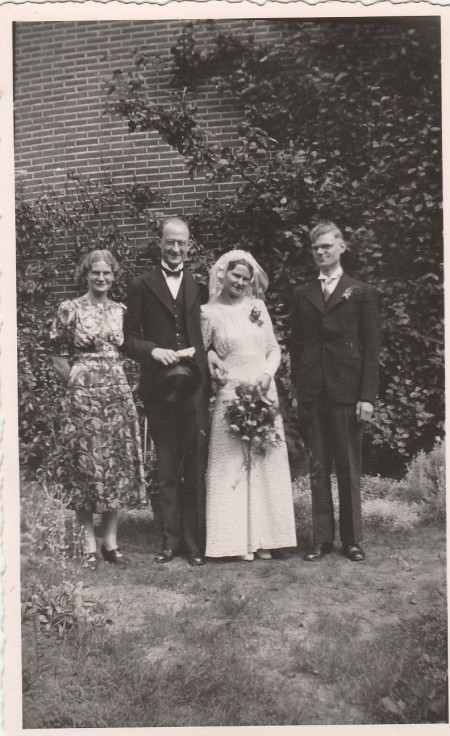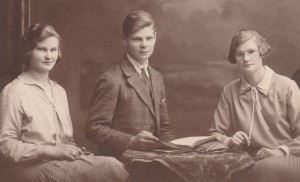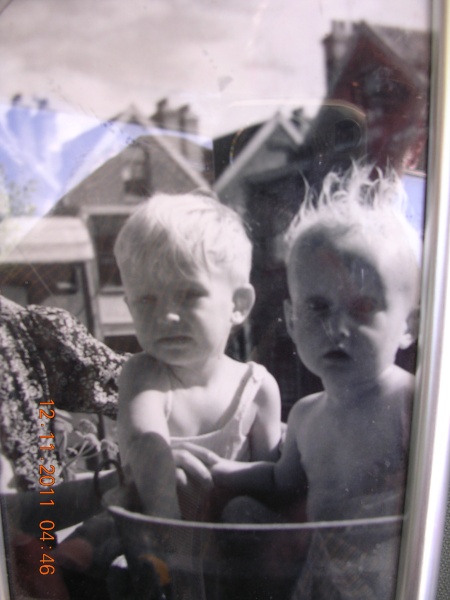The firing of the shotgun and the commotion in the street resulted with Frank being put in a police paddy wagon. My parents were interviewed . They must have told police of problems they were having with Frank’s violence. The incident with the scissors was considered serious enough and culminated with Frank being taken away to Callan park for assessment. Callan Park was a mental asylum situated close to the City in very large park like surroundings. It consisted of many double story Georgian old sandstone buildings. It had a very high wall around it and looked intimidating when approached from the front. It would be Frank’s main home for the next fourteen years. He was diagnosed as suffering from schizophrenia.
A sigh of relief was washing over our family. The children came home from school without the fear and expectation of another shemozzle or explosion of anger. We could sit around without skulking away in our rooms, out of troubles way. Dad and mum were happy that Frank would now get care and attention from experts in a place designed for people with a mental illness. A cure or some form of action would be initiated and Frank would get back in charge of a life and return home soon. That must have been my parents fervent wish. And, surely not one that could be seen as extravagant?
My memories so far are from between fifteen and twenty years of age, so the atmosphere and family life then lived is from that period which since has clocked up another fifty years. And yet, it will not let go of me. What is this compulsion and why can’t this episode let go of me? Is there a link somewhere that explains those events of much further down life’s river? Were Hansel and Gretel’s white pebbles of this period strewn already then? Will an answer be there when the trail has been followed to the end ?
It has to be admitted that my view of Australia hasn’t always been so benign and lofty as they should or could have. I have spent far more years here than anywhere else and am a naturalised Australian, born in Holland. So why at times, the chagrin? The naturalisation ceremony and oath were taken with swearing allegiance to the Queen of England, which I thought odd as I could have sworn we migrated to Australia. But, the cup-o-tea and the S.A.O. crackers with ‘tasty’ cheese ( Salvation Army Officer) afterwards were welcome. It was a mass naturalisation ceremony at the Sydney Town Hall. It was a period when cinema goers were slowly starting to refuse and stand up for the National Flag raising and Save the Queen anthem before the movie. Some cinemas had a Hammond organ rising up majestically from below the stage. A Liberace like suited and war medalled bedecked man would belt out this Anthem. It did not help and soon no one stood up anymore and this little irrelevant ditty was dropped. Oddly enough, Australia today still prefers the monarchy to a republic. If ever there was proof of being a bit miffed about Australia. Just contemplate that little contradiction!
The initial stay of my brother Frank at Callan park was short lived. My memory of the first visit to Frank at Callan Park asylum was when the brother to brother recognition was first starting to melt and flee. It was a pitiful sight. He was so dishevelled and had trousers that were not his. They were for someone twice his size and without a belt. He could only walk by holding his trousers with both hands. The warden unlocked him with a large bunch of keys hanging from his belt. No chairs for visitors, no visiting areas. Just a large court-yard with no trees.
The demented and the declared insanely inebriated patients standing there as if all hope was now held by the unyielding surrounding stone wall, spoken to in gravelled voices. Frank said he had been held in wet bed sheets for hours. Later on we found out that that method was common to restrain patients. He was so very much not there and must have been heavily pilled up. I asked were his clothes were. Mum had brought some oranges which she peeled for him. Frank smoked a cigarette from a packet that dad had brought along…Was Frank going to be lining that court yard and become part of the stone wall? Mother had tears and dad was numb with shock but had to drive home with much silence in the car.
We could not get over that visit and the sun wasn’t shining much better with Frank not at home. The nightmare of Callan Park courtyard and the bunches of keys hanging from the wardens belt wasn’t acceptable, the wrapping up of Frank in wet bed-sheets. This was 1960 not 1860. Frank soon came home again.
Tags: Australia, Callan Park, Frank, Police, Rotterdam




May 19, 2015 at 12:04 pm |
Looking at that photo of those cute blond babies from the perspective of a parent, it breaks your heart to think one of your children could have such a hard road ahead. Mental health may be better understood and treated now, but it still has a long, long way to go. A friend of mine recently witnessed the system here first hand when a loved one had a break down. It was only when the family transferred him to a private facility that the treatment stepped into the 21st century and became effective. Shameful.
As for the National Anthem … up into my teens I remember it being played when the BBC went off air at night. I had been brought up to respect the monarchy and felt really guilty for not standing up in my own living room when I was the last one to bed. I’m not much of a monarchist these days – I think it very sad that the most recent additions to the Windsor family will never know a life of their own, no matter what privilege they are born into.
LikeLiked by 3 people
May 20, 2015 at 12:40 am |
That’s right Julia;
It must have been so hard for my parents. We, as kids had an outlet and would scatter to friend’s places when Frank arrived home again. Schizophrenia remains a mystery but the care has improved even here in Australia.
A big mistake was made in the eighties when all mental institutions were closed down without replacing sufficient care and support. Many ended up in boarding houses with financial support going to the boarding house owners for the upkeep of the patients (clients). Teeth, feet and general care became worse. Many are now seen wandering the streets.
Frank would never fit in in such kind of care. The medications would be administered ad hoc at best or worse, simply stolen by others.
LikeLiked by 4 people
May 19, 2015 at 12:06 pm |
A sad and alarming reflection of the treatment available at the time. In the 1990s I worked for a while in the day-unit of a large mental hospital, with a sizeable proportion of schizophrenic ‘clients’. They actually lived in small community houses and travelled to the hospital every day. The management of such sufferers was much improved, but cures…? Even realistic treatment, apart from drug control, no.
LikeLiked by 4 people
May 20, 2015 at 12:48 am |
That sounds very much like what Frank has in Holland. His care was amazing and each time in the past and visited Frank we would get doctors explain the treatment they were giving. Forever trying out new ideas and above all, keep Frank included in activities. There was soccer, holidays in France, camping, Dental care, podiatry and reasonable freedom. He enjoyed stamp collecting, has his own room with TV etc. He has/had his own income and could go to the bank, withdraw cash, buy his cigarettes and whatever else he felt he needed. Today he is wheelchair bound, not least as a result of having jumped off a bridge while he was still in Australia.
It was so grim here and yet so different in Holland.
LikeLiked by 3 people
May 19, 2015 at 5:34 pm |
Your writing is full of humanity and warmth Gerard, even when describing the problems the family and Frank faced at that time. I shudder to think what it must be like being a patient in such a hospital. I have great sympathy for Frank. There but for the grace of God go many of us.
LikeLiked by 4 people
May 20, 2015 at 12:52 am |
Thanks Andrew,
Yes it is a bit of a lottery, the throwing of dice that determines so much of life.
LikeLike
May 19, 2015 at 6:22 pm |
Looking at the picture of Frank and yourself it is impossible to conceive that one of you would turn out to be schizophrenic and the other your good self. You were brought up in the same environment, after all, though you would experience it differently.
How do we explain such things?
LikeLiked by 4 people
May 20, 2015 at 12:59 am |
Frank did have diphtheria early in his life and that might have been a cause for his later illness. The shortage of food during the war, another one. Who knows?
In the early sixties, the psychiatrists tried to sheet home, that in some way my parents’ relationship with Frank was to blame or that their parenting was dysfunctional. Poor mum making all those stacks of sandwiches, working tirelessly for everyone’s benefits. Dad working overtime, never a pub, a gamble or hot other woman. His cigarette and short wave radio with heaven above, his life so well lived.
LikeLiked by 2 people
May 20, 2015 at 8:38 pm
Yes, there were some very damaging theories let loose in the 1960s. Epigenetics is getting a little closer to an explanation and there seem to be differences in the volumes of some parts of the brains of sufferers – but whether this is cause or effect is still unknown. However you look at it, your parents bear no blame.
LikeLiked by 2 people
May 19, 2015 at 11:47 pm |
This is a heartwrenching story, Gerard. Your pain of it all comes from your love for Frank and your family. And all this on top of the transition in a strange environment as a migrant.
I saw so much here in Australia, of what the Allied told us was wrong with Germany. I did not swear allegiance to the Queen. I waited till they abolished this necessity.
LikeLike
May 20, 2015 at 1:02 am |
Thanks Peter,
Yes, I imagine you would have copped a fair bit of anti German as did my brother in law. He missed out a fair bit of early school because of the anti German bullying.
Yet, Germans were the best and most sought after workers in Australia.
LikeLike
May 21, 2015 at 7:27 am
I do not believe Peter experienced any anti-German bullying, Gerard. As far as I am concerned, there was a lot wrong in Germany under the Nazi regime. Sure enough the allied occupation force did their best to educate us Germans to choose a better path into our future. Sadly a lot in present day Australia does not seem to be a path we do feel comfortable about. But then, it is a complicated world with too many disadvantaged people, isn’t it?
LikeLiked by 2 people
May 21, 2015 at 8:54 am
I have to concur with Aunty Uta in that I did not experience any anti-German resentment in Australia. Perhaps everybody perceived me as a “good” German. Often people ask me whether I’m Dutch.
Because of the criticism of the Allied Germany became a very liberal country. I give you one example. We were told that it is wrong to give boys a military training. When we came to Australia we observed boys in uniform doing drills, with weapons, in the school grounds. They were called cadets. The getting up for the Queen in the cinema and swearing allegiance to her was another such point.
We had learnt, that what was wrong with Germany and their reluctance to revolt against Hitler was, that they had to swear allegiance to him. When we came here people jumped even up for her in the cinema. We soon joined the dissenters. We actually felt a bit odd as we thought it is their country.
LikeLike
May 21, 2015 at 9:34 am
Peter and Uta,
My brother in law was a small German boy going to primary school in Australia for the first time. He was bullied and missed out on a lot of his schooling. As a 15 y old boy I was somewhat bullied at factories not because of Dutch but more because bullying was the norm almost everywhere I worked.
As adult workers it might have been different especialy if there were many foreign workers employed.
I still can’t get over school boys going to school with mock rifles and millitaire type uniforms. I think there are still cadets today going to schools.
LikeLiked by 1 person
May 20, 2015 at 3:24 am |
Gerard, this is such a heartfelt post, and brought much back for me too. My Italian husband had his first ‘shock treatment’ in Sydney. Those institutions were dreadful, but closing them wasn’t the answer either. Your parents must have endured so much sadness, seeing Frank develop his illness.
LikeLiked by 1 person
May 21, 2015 at 9:39 am |
I am not aware of the state of mental health today in Australia. I know that costs are cut in many budgets and that jails are used to keep people that need a different kind of treatment.
My parents did overcome and the tail end of their lives was very satisfying knowing that Frank was finally getting good care. We visited them often and so did our children and most of those other grandchildren as well. They also came to Australia a number of times.
LikeLike
May 20, 2015 at 5:32 am |
Thank you, Barbara. Yes, the ‘shock’ and ‘deep sleep’ therapy. That story is yet to come.
Dr Harry Baily was the super-intendent and what carnage he caused. Dreadful things were exposed as a result of some caring people.
LikeLiked by 1 person
May 20, 2015 at 5:12 pm |
Such a sad story, Gerard. I feel for you, your family, and your brother. The treatment of the mentally ill is such a dark stain on our history. I remember visiting an asylum for a psychology class I was taking in the 60s. It was like stepping into another world where nothing was as it seemed. The US saw the same closing of facilities in to 80s, partially as a way of saving money (Reagan), and partially because mental health experts felt patients could be better cared for in local clinics while on medications. It didn’t work. Most of the clinics were never funded and the patients ended up in the streets, becoming America’s homeless population. Many of these people were returning soldiers from Vietnam who never received the care they so desperately needed. It is a problem that has continued up to this day. –Curt
LikeLiked by 1 person
May 21, 2015 at 9:41 am |
That is right Curt.
It was one thing to close mental institutions but it wasn’t replaced with a caring alternative. It was just to save money for the government.
Crimes are now often committed by people who are mentally ill.
LikeLiked by 1 person
May 20, 2015 at 5:52 pm |
No wonder you can’t let go of this traumatic experience Gerard. These illnesses always take their toll on the entire family. How very sad to see your little one developing such violent tendencies. I hope Frank found the help he needed later.
My daughter’s training was in the mentally challenged, though while in college they went to an asylum for study as well. It takes special people to help those in need.
LikeLike
May 21, 2015 at 9:43 am |
Yes, Kayti.
It does take a special person to work in places for the mentally ill. It is so unpredictable.
LikeLike
May 23, 2015 at 10:48 am |
Callan park has a dark dark history it must have been frightening to vist your brother and no wonder those memories hover. I remrmber my friend setting up an awesome community house in the 80’s following the closure of the large hospital based settings we were excited but the money was short lived and the neighbours angry. A failed attempt by some very committed people (no pun intended).Society was not ready….
LikeLike
May 24, 2015 at 12:18 am |
Wasn’t it wonderful to see Finland’s entry in Eurovision? Mental health care takes money as well as lots of care but in comparison with fighting wars and the billions spent, it is very little and has such a huge impact..
LikeLiked by 1 person
May 24, 2015 at 12:30 am
Didnt see it Gerard might watch the final…… the price of war to humanity particularly in mental health to victor as well as oppressed is obviously of no interest to those who claim the spoils of war. ….if it was, Haliburten, Wackenhut et al would be making massive donations for refugees amputees and PTSD to name a few.
LikeLike